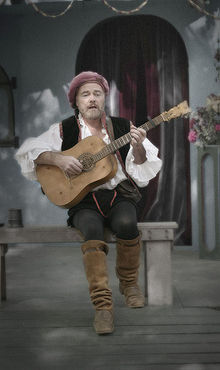- Minstrel
-
For the 19th century American form of music and performance known as minstrelsy, see minstrel show. For the chocolate sweets sold in the UK, see Minstrels (chocolate). For the Irish patriotic song, see The Minstrel Boy.
A minstrel was a medieval European bard who performed songs whose lyrics told stories of distant places or of existing or imaginary historical events. Although minstrels created their own tales, often they would memorize and embellish the works of others. [1] Frequently they were retained by royalty and high society. As the courts became more sophisticated, minstrels were eventually replaced at court by the troubadours, and many became wandering minstrels, performing in the streets and became well-liked until the middle of the Renaissance, despite a decline beginning in the late 15th century. Minstrelsy fed into later traditions of traveling entertainers, which continued to be moderately strong into the early 20th century, and which has some continuity down to today's buskers or street musicians.
Contents
History
Initially, minstrels were simply servants at Court, and entertained the lord and courtiers with chansons de geste or their local equivalent. The term minstrel derives from Old French ménestrel (also menesterel, menestral), which is a derivative from Italian ministrello (also menestrello), from Middle Latin ministralis "retainer," an adjective form of Latin minister, "attendant" from minus, "lesser".
In Anglo-Saxon England before the Norman Conquest, the professional poet was known as a scop ("shaper" or "maker"), who composed his own poems, and sang them to the accompaniment of a crude harp. In a rank much beneath the scop, were the gleemen, who had no settled abode, but roamed about from place to place, earning what they could from their performances. Late in the 13th century, the term minstrel began to be used to designate a performer who amused his lord with music and song.
In a complex way involving invasions, wars, conquests, etc., two categories of composers originated. Poets like Chaucer and John Gower appeared in one category wherein music was not a part. Minstrels, on the other hand, swarmed at feasts and festivals in great numbers with harps, fiddles, bagpipes, flutes, flageolets, citterns, and kettledrums.
As early as 1321, the minstrels of Paris were formed into a guild. A guild of royal minstrels was organized in England in 1469. Minstrels were required to either join the guild or to abstain from practicing their craft. Some minstrels were retained by lords as jesters who, in some cases, also practiced the art of juggling. Some were women, or women who followed minstrels in their travels. Minstrels throughout Europe also employed trained animals, such as bears. Minstrels in Europe died out slowly, having gone nearly extinct by about 1700, though isolated individuals working in the tradition existed even into the early 19th century.
See also
- Thomas Ercildoun
- Minstrels' gallery
- Kobzar
References
- ^ A history of English literature: in a series of biographical sketches, By William Francis Collier
External links
- Stella Fortuna: Medieval Minstrels (1370), from Ye Compaynye of Cheualrye Re-enactment Society. Photos and Audio Download.
- Essays on the Origin of Western Music. Word Document Download.
- Edward II and Minstrels (31 Jan 2009), Edward II Blog.
- Terry Jones' Medieval Lives (2004), Season 1, Episode 6.
Categories:- Entertainment occupations
- Renaissance fair
Wikimedia Foundation. 2010.

